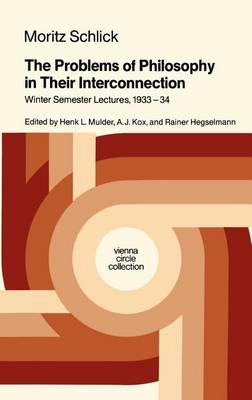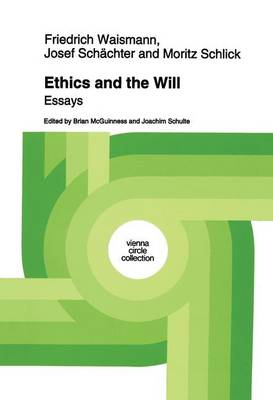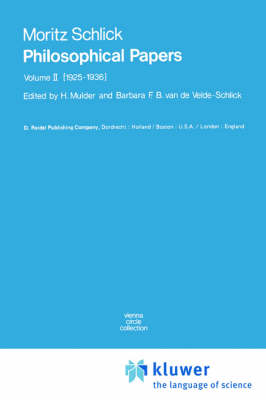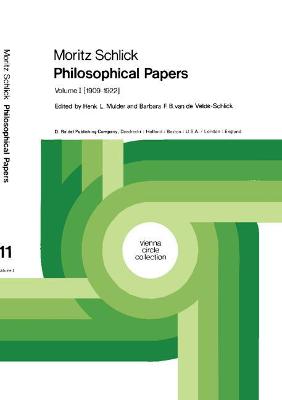Vienna Circle Collection
3 primary works • 5 total works
Book 2
This book is the first English version of Prolegomena zu einer kritischen Grammatik, published by Julius Springer, Vienna, 1935, as Volume 10 of the Vienna Circle's series Schriften zur wissenschaftlichen Weltauffassung. The prefatory remarks of both editor and author acknowledge the influence ofWittgenstein in a general way. However, in aim and approach, the work differs from Wittgenstein's Philosophische Grammatik (l969). This is indeed based on material going back to 1932, some of which Schachter must have known. On the other hand, the present Prolegomena not only explains the general, philosophical principles to be followed, but in the light of these proceeds to cover the entire range of conventional grammar, showing where that is uncritical. Whether Wittgenstein in his turn knew of Schachter's work has never been explored. Schachter's object is universal grammar. As is natural, the examples in the original are largely drawn from German grammar, with occasional minor excursions into other languages. For English readers, what matters are the general problems of grammar: there is no point in tying these to the linguistic peculiarities of German, let alone a local variety of it. One who can grasp German at that level might as well read the original. The translation is therefore twofold: the text as a whole has been rendered into English, and the entire apparatus of examples has been replaced, as far as this can be done, by illustrations from English grammar, chosen so as to bring out the same kinds of problem as in the original.
Book 18
Book 21
Ethics and the Will
by Friedrich Waismann, Josef Schachter, and Moritz Schlick
Published 31 May 1994
INTRODUCTION The present volume unites contributions by the leading figure of the Vienna Circle and by two of his closest assoCiates, contributions that deal with an area of thought represented, indeed, in this Collection but certainly not the central one in the common picture ofthe Circle's activities. It is no accident that an interest in ethics and the philosophy of action was particularly marked in what Neurath was apt to call the right wing of the Circle. For them, as for Wittgenstein (the respected mentorofSchlickandWaismanninparticular),theadvancetobehoped for in philosophy consisted not solely in freeing natural science from a confused sense of dependence on speculative metaphysics but also in seeingthatotherareasoflanguageandaction hadto bethoughtaboutin theirownterms, whichwereneitherthoseofnaturalsciencenorthoseof philosophy as traditionally conceived. The scepticismofSchlick about theprogrammeofUnifiedSciencewaswellknown: EinheizwissenschaJt he called it, as it might be 'boozified science'.
And in sober truth the programme sometimes masked a left-wing set of values taken (surely illogically) for granted, though the membersofthe Circle entertained a wide range ofpolitical views. Schlick's own contribution to the present volume is a section from thenotesforoneofhisfinal lectureseries,forsightofwhich wewarmly thanktheonlysurvivingcontributortoourvolume,DrJosephSchachter: Schlick'sgrandsonDra. M. H. vandeVeldehaskindlyconsentedtotheir publication. This section poses the problem we have outlined: there are questionsandaneedforclarificationinethics,butthesenomoredemand a metaphysical solution than does a similar situation in epistemology. Here, as in his earlier Problems of Ethics,l Schlick sets his face against thewholeprocess,mostobviousin Kant,ofmakingtheconceptofvalue absolute. One might say that for Schlick there is no unhypothetical imperative.
And in sober truth the programme sometimes masked a left-wing set of values taken (surely illogically) for granted, though the membersofthe Circle entertained a wide range ofpolitical views. Schlick's own contribution to the present volume is a section from thenotesforoneofhisfinal lectureseries,forsightofwhich wewarmly thanktheonlysurvivingcontributortoourvolume,DrJosephSchachter: Schlick'sgrandsonDra. M. H. vandeVeldehaskindlyconsentedtotheir publication. This section poses the problem we have outlined: there are questionsandaneedforclarificationinethics,butthesenomoredemand a metaphysical solution than does a similar situation in epistemology. Here, as in his earlier Problems of Ethics,l Schlick sets his face against thewholeprocess,mostobviousin Kant,ofmakingtheconceptofvalue absolute. One might say that for Schlick there is no unhypothetical imperative.
11b
11a




